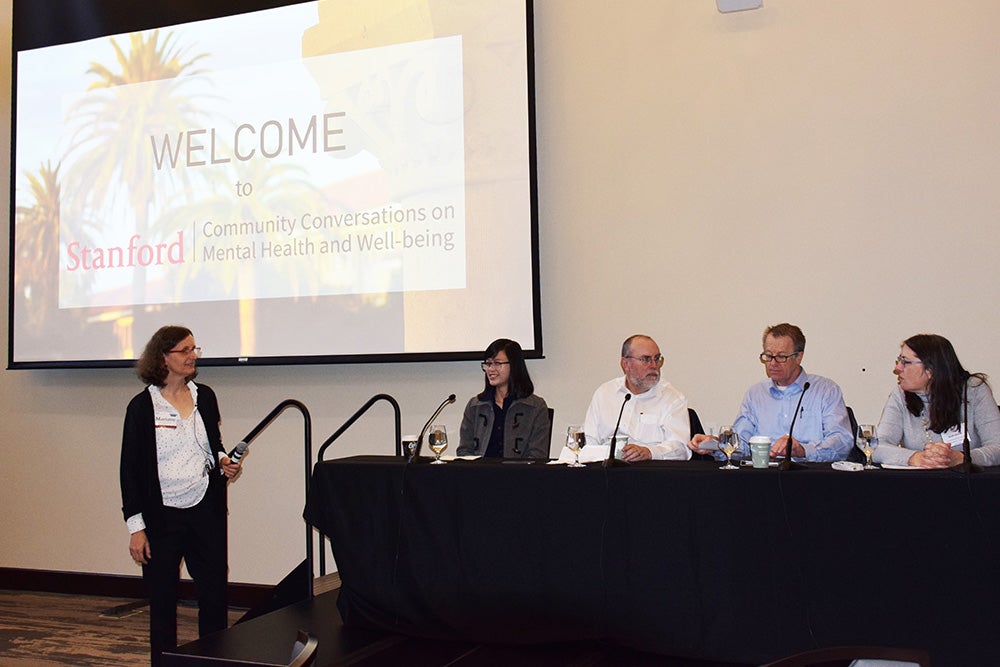Stanford focuses on mental health during two-day campus conference
Members of the Stanford community focused on issues of mental health and well-being at a two-day event that featured campus experts leading more than 20 sessions on a wide range of topics of concern, from depression to caregiving to substance abuse.
Members of the Stanford community – students, faculty and staff – gathered for two days on Feb. 3 and 4 to focus on issues of mental health at a first-time event called Community Conversations on Mental Health and Well-Being.

Panelists from the session “De-Stressing the Academic Experience”: (left to right) Mariatte Denman, associate vice provost, Center for Teaching and Learning; Vianna Vo, ’22, director, ASSU Mental Health and Wellness; John H. Barton, director, Architectural Design Program; Lars Osterberg, co-director, Stanford Medicine Teaching and Mentoring Academy; Sarah Church, vice provost for faculty development. (Image credit: Angie Chan-Geiger)
Sponsored by the Office of the Provost, the event offered more than 20 sessions on the main campus in Paul Brest Hall and at the Redwood City campus. Stanford experts led workshops and presentations on topics ranging from addiction, caregiving and gender inclusivity to grieving, belonging and building resilience.
Attendance was estimated at more than 800 people, with another 215 participating in the sessions offered via video conferencing.
At the Monday evening community dialogue, “Crafting a Culture of Belonging,” held at the Faculty Club, Provost Persis Drell expressed the purpose of the conference.
“Our hope for this event is to shine a light on mental health and well-being and to provide tools we can all use to manage the challenges in our lives, help others and, ultimately, increase our ability to thrive,” she said.
“It’s wonderful to see so many members of our community – students, faculty and staff – participating. It demonstrates the importance of mental health to the Stanford community and the relevance of the programming we’re offering over the course of these two days. Whether we struggle with mental illness ourselves or know someone who does, the issue affects us all – at work and at home, and in our interpersonal relationships.”
Session highlights
On Monday, Thomas Ellis, embedded psychologist at the Stanford Graduate School of Business, gave a presentation on the effects of smartphones on mental health and relationships. His presentation included suggestions for mindful smartphone use such as putting away the phone during social situations, turning off push notifications and observing a regular “no tech day.”
Ellis noted, “We can’t stop the [technology] train, but we can ask what are our values and how does the technology match our values?” He encouraged attendees to “put down the technology and interact face-to-face.”
Suzanne Jones, whose work takes her around the world helping people heal from trauma, led a Tuesday session called “There Is Nothing to Fix,” based on the findings in her book of the same title. She outlined the triggers of stress – lack of control, uncertainty and lack of information – and how the mind and body react in stressful situations. She then led the group in exercises that she called a “starter kit” for managing stress.
“I’m thrilled that everyone was so engaged. It’s very encouraging. People want to find peace in life, and if we can give them the tools for that, then we’re spreading change,” said Jones.
Between sessions, attendees had the opportunity for informal discussions and community building.
Angie Hawkins from the Office of the Vice Provost for Graduate Education, who attended the “Grieving at Stanford” session, said, “It’s important that we continue these conversations after the conference. I appreciated the speakers giving us a hands-on framework for understanding grief and comforting yourself and others who are grieving. It was timely and very much needed.”
In another session, Victor Carrión, the John A. Turner Endowed Professor for Child and Adolescent Psychiatry, led a conversation on resilience called “What Gives Us Strength?” He spoke about the physiological and mental impact of stressors and the power of community in building resilience.
“If we nurture our environment, it can have a huge impact on our health. As humans, we are always seeking connection, and our environment can be healing,” he said.
A session titled “De-Stressing the Academic Experience” closed out the two-day event. Panelists from the Architectural Design Program, Stanford Medicine, the Center for Teaching and Learning and the Associated Students of Stanford University (ASSU) discussed ways they have addressed the issue of student stress by prioritizing wellness, flexibility and empathy in the classroom, thereby building stronger learning communities.
John Barton, director of the Architectural Design Program, encouraged a healthier attitude around deadlines and testing. “Students are supposed to learn something, not just get something done. We need to build a bridge to students,” he said.
Undergraduate student Vianna Vo, panelist and director of ASSU Mental Health and Wellness, urged faculty to be clear in setting classroom norms in order to create an inclusive and welcoming learning environment.
Community Conversations on Mental Health and Well-Being was sponsored by the Office of the Provost and was organized in collaboration with Stanford’s existing mental health resource offices, the Office for Religious Life, University Human Resources, Student Affairs, the Department of Psychiatry and Behavioral Sciences, and the Stanford Mental Health Coalition. A steering committee comprising individuals from these offices and organizations developed the programming for the event.
Stephanie Kalfayan, vice provost for academic affairs, who led the steering committee, was pleased with the event.
“Everyone on the steering committee was delighted with the level of participation and enthusiasm from the attendees. We had a particularly large showing from staff, which is great to see,” she said. “We hope that the Stanford community gained insights and acquired some new strategies to cope with the difficulties we all face in life.”
